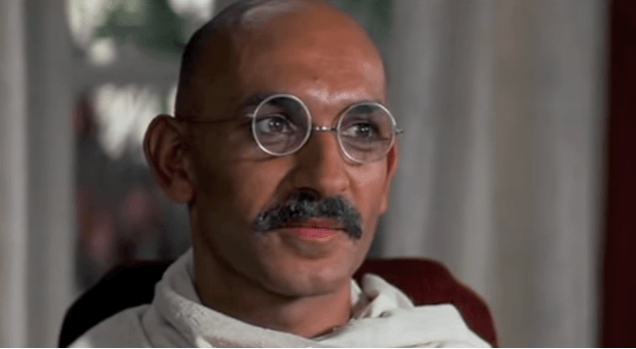
A man who changed the course of the future of India with his ideas of non-violence and political and religious peace, Mahatma Gandhi is a name held in reverence even after seven decades since his demise. The number of lives he impacted is numerous, and the ideas he helped shape develop are relevant even today.
Whether or not one endorse the philosophy propounded by Gandhi, it is impossible not to be intrigued by the novel concepts he introduced during his lifetime. A leader by example, his "experiments with truth" and struggles to maintain a simple life has been an inspiration to many.
The intriguing tales of Gandhi's life have been depicted in several films and he has been shown in different perspectives - as the sombre leader of the Indian Independence movement, as the estranged father of an ambitious son, as a cheerful, imaginary friend who offers sagely advice, and so on. In fact, any film that even mentions the Indian Independence struggle, does not do so, without bringing Gandhi into the picture.
On the 145th Gandhi Jayanti, here is a look at some of the movies which centres around Gandhiji and his principles:
Gandhi (1982)
The list has to start with Richard Attenborough's film "Gandhi", which is widely regarded as the best biographical take on Mahatma Gandhi. The epic biographical film, which dramatises the life of Gandhiji, begins with his assasination and flashes back to a pivotal point in the non-violent revolutionary's life: getting thrown out of a South African train for sitting in a first-class compartment despite having a first-class ticket, just because he is brown-skinned. It is at this moment that he decides to start a non-violent protest campaign for the rights of all Indians in South Africa.
The international project was shot in India, stars several Indian actors such as Amrish Puri, Om Puri and Saeed Jaffrey. Rohini Hattangadi plays Kasturba Gandhi, Mahatma's wife. Ben Kingsly, who is partly Indian, played Mahatma Gandhi, a role that won him the Oscar for Best Actor.
The film grossed a total of $52.7 million in the United States and won eight Academy Awards.
Maine Gandhi Ko Nahi Mara (2005)
In this dramatic film that focuses on a retired Hindi professor affected by dementia, Mahatma Gandhi is not so much of a character as he is an idea. The protagonist, played by the versatile Anupam Kher, believes he killed Gandhi by accidentally playing with a toy gun, which had real bullets and shooting Gandhi during his walk in Birla House.
The professor's dementia worsens after he sees someone carelessly place an ash tray on a newspaper photograph of Mohandas Gandhi. Although the film did not do well in the box office, Kher's perfomance was much appreciated and even won him a special jury award at the National Film Awards and several international film festivals
Lage Raho Munnabhai (2006)
The comedy film, which is a sequel to Rajkumar Hirani's Munna Bhai MBBS, has the protagonist Munna Bhai, played by Sanjay Dutt, interacting with the spirit of Mahatma Gandhi. During their interactive sessions, Gandhiji teaches the underworld don how to employ "Gandhigiri" to solve everyday problems. Dilip Prabhavalkar donned the role of Mahatma Gandhi in this blockbuster, which grossed over ₹1.19 billion (US$19 million) worldwide.
A box office success and a favourite with the award jury, "Lage Raho Munna Bhai" is the first Hindi film to be shown at the United Nations.
Gandhi My Father (2007)
While most movies on Gandhi depicted him as the prolific leader of the Indian Independence movement, "Gandhi My Father" gives a unique take on Gandhiji as a father and a family man. The movie, which is based on his son Harilal Gandhi's biography, "Harilal Gandhi: A Life", shows that despite being the father of the nation, he could not be a good father to his son.
The film deals with the intricate, complex and strained relationship between the father and son, whose dreams were set in opposite directions. Darshan Jariwala played father to Akshaye Khanna's Harilal Gandhi, in the film that won the special jury and best screenplay awards at the 2008 National Film Awards.
Gandhi to Hilter / Dear Friend Hitler (2011)
"Dear Friend Hitler", released as "Gandhi to Hitler" is a multilingual Indian drama film set during the World War II is based on letters written by Mahatma Gandhi to the leader of the Nazi Party and Chancellor of Germany Adolf Hitler.
The film, starring Avijit Dutt as Gandhiji and Raghubir Yadav as Hitler, also focuses on the relationship between the latter and his his long-term lover Eva Braun, played by Neha Dhupia.
The film, which contrasts the ideologies of Gandhi and Hitler and claims the superiority of Gandhism over Nazism, was called an "unnecessary play with history" by The Times of India.






!['Lip lock, pressure, pyaar': Vidya Balan- Pratik Gandhi shine in non-judgmental infidelity romcom Do Aur Do Pyaar [ Review]](https://data1.ibtimes.co.in/en/full/797104/lip-lock-pressure-pyaar-vidya-balan-pratik-gandhi-shine-non-judgmental-infidelity-romcom.jpg?w=220&h=138)








